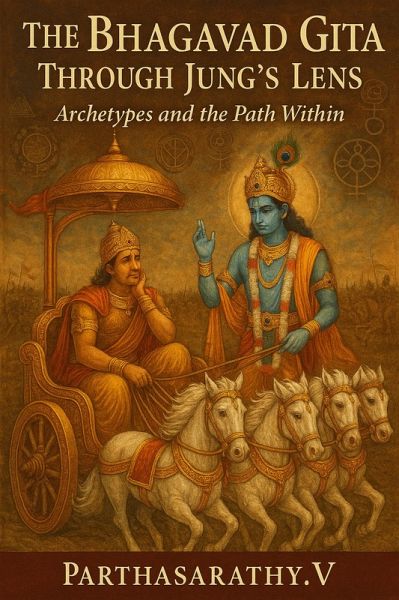
The Bhagavad Gita Through Jung's Lens: Archetypes and the Path Within (eBook, ePUB)

PAYBACK Punkte
0 °P sammeln!
The Bhagavad Gita through Jung's Lens: Archetypes and the Path Within offers a groundbreaking synthesis of ancient Eastern wisdom and modern Western psychology, revealing how one of humanity's greatest spiritual texts provides a complete roadmap for psychological integration and personal transformation.When the warrior Arjuna faces his own relatives on the battlefield of Kurukshetra, his moral crisis mirrors the universal human confrontation with the shadow-the first and most crucial step in Carl Jung's process of individuation. This book unveils how Krishna's teachings to the paralyzed warrio...
The Bhagavad Gita through Jung's Lens: Archetypes and the Path Within offers a groundbreaking synthesis of ancient Eastern wisdom and modern Western psychology, revealing how one of humanity's greatest spiritual texts provides a complete roadmap for psychological integration and personal transformation.
When the warrior Arjuna faces his own relatives on the battlefield of Kurukshetra, his moral crisis mirrors the universal human confrontation with the shadow-the first and most crucial step in Carl Jung's process of individuation. This book unveils how Krishna's teachings to the paralyzed warrior perfectly correspond to the stages of psychological development that Jung identified as essential for becoming a whole human being.
Through eighteen illuminating chapters, each exploring a different stage of consciousness evolution, readers discover how:
· Arjuna's initial paralysis represents the ego's first encounter with the shadow archetype
· Krishna's role as divine teacher embodies Jung's Wise Old Man, guiding consciousness toward wholeness
· The path of detached action demonstrates healthy persona development without ego-inflation
· Devotional practices activate the anima/animus archetypes for psychological balance
· The cosmic vision provides direct encounter with the collective unconscious in its totality
· Ultimate surrender completes the individuation process through conscious service to the Self
This is not merely an academic comparison but a practical guide for modern seekers facing the same fundamental questions that have challenged humanity across cultures and centuries: How do we act with integrity in a complex world? How do we love without possessiveness? How do we serve without ego? How do we find meaning in the face of life's inevitable conflicts?
By reading this ancient dialogue through Jung's psychological framework, contemporary readers gain access to profound insights about shadow work, persona refinement, archetypal integration, and Self-realization that speak directly to the challenges of modern life. The book demonstrates how the Gita's teachings on duty, devotion, and wisdom provide exactly the guidance needed for navigating the individuation process in the 21st century.
Written for psychologists, spiritual seekers, students of comparative religion, and anyone interested in personal transformation, this book bridges the gap between Eastern philosophy and Western psychology, showing how both traditions point toward the same ultimate goal: the development of integrated consciousness capable of serving both individual fulfillment and collective harmony.
The Bhagavad Gita through Jung's Lens reveals why this ancient text remains endlessly relevant to the modern psychological journey, offering both timeless wisdom and practical guidance for anyone committed to the path of conscious development and authentic wholeness.
"Where there is Krishna, the master of yoga, and where there is Arjuna, the supreme archer, there will certainly be prosperity, victory, happiness, and sound morality." -Bhagavad Gita 18.78
The battle for consciousness begins within. This book provides the map for victory.
When the warrior Arjuna faces his own relatives on the battlefield of Kurukshetra, his moral crisis mirrors the universal human confrontation with the shadow-the first and most crucial step in Carl Jung's process of individuation. This book unveils how Krishna's teachings to the paralyzed warrior perfectly correspond to the stages of psychological development that Jung identified as essential for becoming a whole human being.
Through eighteen illuminating chapters, each exploring a different stage of consciousness evolution, readers discover how:
· Arjuna's initial paralysis represents the ego's first encounter with the shadow archetype
· Krishna's role as divine teacher embodies Jung's Wise Old Man, guiding consciousness toward wholeness
· The path of detached action demonstrates healthy persona development without ego-inflation
· Devotional practices activate the anima/animus archetypes for psychological balance
· The cosmic vision provides direct encounter with the collective unconscious in its totality
· Ultimate surrender completes the individuation process through conscious service to the Self
This is not merely an academic comparison but a practical guide for modern seekers facing the same fundamental questions that have challenged humanity across cultures and centuries: How do we act with integrity in a complex world? How do we love without possessiveness? How do we serve without ego? How do we find meaning in the face of life's inevitable conflicts?
By reading this ancient dialogue through Jung's psychological framework, contemporary readers gain access to profound insights about shadow work, persona refinement, archetypal integration, and Self-realization that speak directly to the challenges of modern life. The book demonstrates how the Gita's teachings on duty, devotion, and wisdom provide exactly the guidance needed for navigating the individuation process in the 21st century.
Written for psychologists, spiritual seekers, students of comparative religion, and anyone interested in personal transformation, this book bridges the gap between Eastern philosophy and Western psychology, showing how both traditions point toward the same ultimate goal: the development of integrated consciousness capable of serving both individual fulfillment and collective harmony.
The Bhagavad Gita through Jung's Lens reveals why this ancient text remains endlessly relevant to the modern psychological journey, offering both timeless wisdom and practical guidance for anyone committed to the path of conscious development and authentic wholeness.
"Where there is Krishna, the master of yoga, and where there is Arjuna, the supreme archer, there will certainly be prosperity, victory, happiness, and sound morality." -Bhagavad Gita 18.78
The battle for consciousness begins within. This book provides the map for victory.
Dieser Download kann aus rechtlichen Gründen nur mit Rechnungsadresse in A, B, CY, CZ, D, DK, EW, E, FIN, F, GR, H, IRL, I, LT, L, LR, M, NL, PL, P, R, S, SLO, SK ausgeliefert werden.



